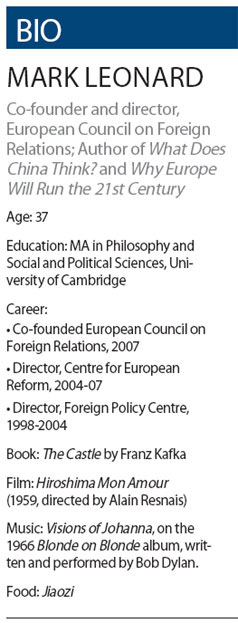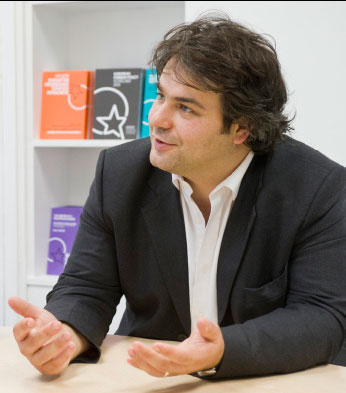What does Leonard think now?
Updated: 2012-01-13 07:52
By Andrew Moody (China Daily)
|
|||||||||||
|
|
A British writer is revising his views on China
The rise of China will make the new world order a lot "messier" than the one we have become accustomed to, says Mark Leonard.
Emerging Chinese power will remove many of the certainties when Europe and the US were in the ascendancy, says Leonard, one of Britain's leading foreign policy intellectuals.
"I see various different models emerging: the European view of the world, the American view of the world and the Chinese view of the world. It is going to make things a lot messier."
Leonard was speaking at the Old Queen Street, London, headquarters of the European Council on Foreign Relations, the think tank he co-founded four years ago and of which he is director.
The modern suite of offices has a continental feel the afternoon of our interview, with wine bottles strewn everywhere, the detritus of a lunchtime celebration.
Leonard used to be something of a prodigy, and it took 18 months to track him down because of his international commitments.
At just 24 he became director of another think tank, the Foreign Policy Centre, which had the backing of former British Prime Minister Tony Blair.
 |
Still a relatively fresh-faced 37, Leonard is best known in China for his book What Does China Think? which, as the title hints, was the result of a series of interviews with Chinese intellectuals.
"It was based on five years or so of some very intense conversations and going back and speaking to the same people many times and reading a lot of Chinese articles and journals over many years," he says.
"I would like to produce a new edition of this, and I am talking to publishers at the moment."
The book challenges the idea that as China develops it will become more like the US or a western European country.
"I suppose the core thesis of the book is that as China becomes richer and more developed it actually becomes less like us," he says.
"The core motivating quest for many of these Chinese intellectuals since at least the mid-1990s, if not even before then, has been an emancipation from the West."
Leonard still makes regular trips to China and was in Chongqing, the behemoth megacity in the west of China, just before our interview.
"I go a bit less than I used to. My wife and I had a son a couple of years ago so I try not to go for very long periods of time. I certainly try to go a few times of year."
He believes the downturn in Europe and the United States presents an opportunity for China to make the transition to a consumer-led society away from the old model of being export driven.
"Necessity is the mother of invention, and the fact the global economy is going through a double-dip recession and that consumption in the west is going to dry up might help."
Leonard, who is from London, studied philosophy and political science at Cambridge before entering the world of think tanks.
As a researcher at Demos in the 1990s, he wrote the Britain report, which is credited with being the origin of the term "Cool Britannia", which characterized the early years of the Blair government.
He may seem to have egg on his face for his first major book, Why Europe Will Win the 21st Century, which now looks somewhat fanciful with the euro zone lurching from crisis to crisis every week.
He is adamant the thrust of his argument was not that Europe was going to be a more important force than Asia or the US this century.
"I didn't say it was to be the dominant region of the 21st century. The core argument of my Europe book was the European Union is the most important innovation in political organization since the creation of the nation state 500 years ago."
He argues that the EU has shifted Europe away from balance of power concepts that led to two world wars to an interdependence based on 80,000 pages of rules that members have to sign up to.
It is a model likely to be taken up by other regions of the world, he says.
"The EU's emergence has set up a regional domino effect where other regions in the world are also integrating and recreating regional communities, and you can see that in the African Union and even in the East Asian Community."
Leonard recognizes all this could go wrong if the euro were to collapse under the weight of current strains.
"I really don't want to trivialize the problems the EU is facing. They are massive, and it is too early to know exactly what is going to happen.
"It is not difficult to predict that if things go badly wrong, the EU might end up disintegrating. It is clearly quite a plausible scenario, but I don't think it is necessarily the most likely one."
Leonard says China itself has been the subject of so many false predictions, and many are forecasting now that its growth is growing to slow markedly as a result of the economy being weighed down by excessive debt.
"Most people are wrong when they try and make long-term predictions about China. Over the years many have predicted it was going to crash, its banks would collapse because of their non-performing loans and various other things.
"I suppose everyone should be quite humble, given the atrocious forecasting that has been done about China's economic prospects."
Leonard believes China's rise means everyone else is having to readjust in some way, particularly the US.
He believes President Barack Obama is more realistic about the new world order than some of his Republican opponents in the US presidential race.
"I think Obama's core political goal has been about reinventing US leadership for a multi-polar world and he is trying to recraft some of the key relationships to allow it to carry on being an influential power. The Tea Party wants America to withdraw and assert itself less."
He says he is reluctant to subscribe to the view of some such as Martin Jacques in his best-seller When China Rules The World that we are all about to live in a Sinocentric world and had better all start learning Chinese.
"Martin is an old and very good friend of mine, and we talk about China every now and again," he says.
"I don't think we are going to have a Sinocentric world, any more than a Western-centric world. China is probably not going to rule the world, but it is going to be one of the rulers."
Today's Top News
Rescuers race against time for quake victims
Telecom workers restore links
Coal mine blast kills 18 in Jilin
Intl scholarship puts China on the map
More bird flu patients discharged
Gold loses sheen, but still a safe bet
US 'turns blind eye to human rights'
Telecom workers restore links
Hot Topics
Lunar probe , China growth forecasts, Emission rules get tougher, China seen through 'colored lens', International board,
Editor's Picks

|

|

|

|

|

|






